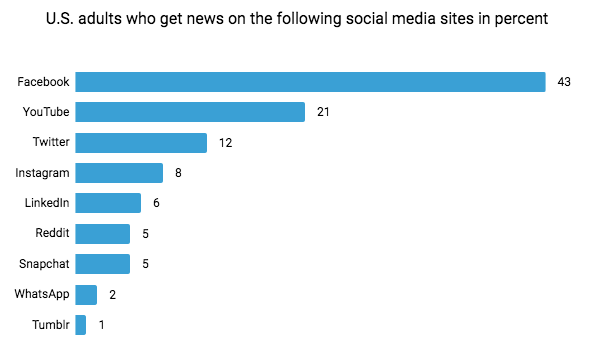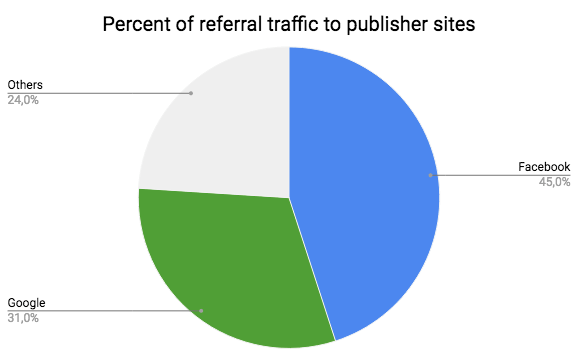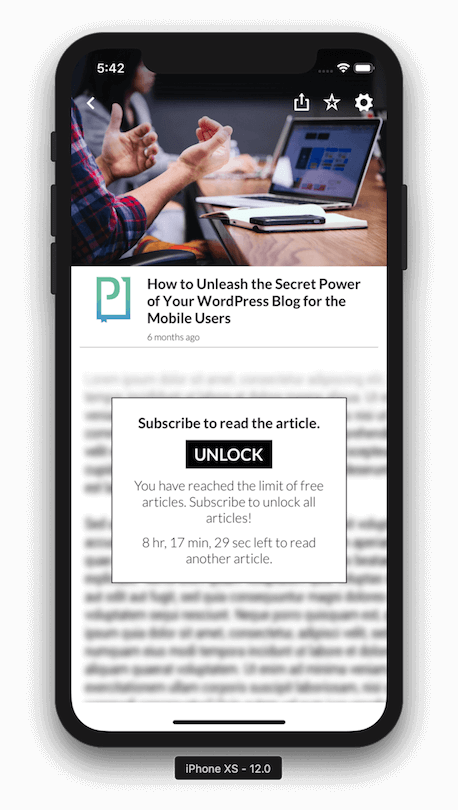Journalism of high value is discriminated against by a system that favors massive and commercial social media platforms functions, e.g. its fast and easy sharing function.
Over the past years, the news publishing industry has experienced three considerable technological changes: the transition from the analog to the digital, social media boost and increase in the usage of mobile devices.
Now, when digital publishing is developing around the world at an extraordinary speed, and readers are increasingly willing to read through mobile apps, two global companies, Facebook and Google, are dominating the advertising and traffic market in digital space, forcing newspapers to change their existing business and distribution models.
Is this a no-win situation?
How about we start with a simple question – who is a publisher? Oh, yes, this is a person or a company who is responsible for creating, preparing and distributing printed or digital publications. Most of us can give a few examples of the world-known publishing houses like HarperCollins, Macmillan, Penguin Random House, or newspapers such as the New York Times or Washington Post.
Let’s move on. What are the biggest social media platforms and technology enterprises? Probably, among the companies you have thought of, were Google or Facebook, am I right? They facilitate the sharing of information on a global scale.
Today, content creators have to be active on different social media channels. They are responsible for writing an article and promoting it. The mutual dependence between the publishing industry and the digital spaces is more complicated than it would seem at first glance. There is no doubt that the publishing process has changed; as a result, we need to redefine the concept of a publisher.
It is time to ask if the difference between the words “publisher” and “platform” is an etymological trifle or the cause of a conflict of interest?
Source of news
The point lies in the way we get and consume news today.
People scroll down Facebook, Twitter or other social sites many times a day, staring for just a few seconds at the titles and headers without going deeper into an article. We got used to having the latest news immediately.

No publisher in the history of journalism had such an impact on global news consumption as Facebook.
Therefore, it’s no wonder that publishers use digital solutions and social platforms that help them stay on the competitive market. This is a strategy used by more and more companies – it is about running a business based on digital platforms, using them primarily for promotional activities. All types of publishers has long been active in this way, promoting their content on Facebook or optimizing it for Google. Are the results really worth it?
Monetizing strategy in the digital reality
Google and Facebook have dominated the network traffic and have consumed most of the revenue from digital advertising. It means that these two world companies are collecting revenue equal to what used to be a payment for high-quality journalism.
The social media offer information for free now, meanwhile content creators pay too little for the value they provide to users.
Facebook and Google are the most important sites for news traffic. According to publishing industry monitors Parse.ly, by the end of 2016 Facebook was responsible for 45 percent of referral traffic to publisher sites, and Google 31 percent.

Newspapers publishers in their business models focused mainly on the sale of advertising space, while Facebook or Google paid equally much attention to effectively reaching a highly profiled user and accounting for the effects of the campaign. Facebook’s advantage over the other media channel also results from the number of users many publishers can only dream about. What is more, Facebook and Google integrate on their platforms content created by both of these groups.
- Google built the software that provided all of the services that an advertiser would need to place an ad to a targeted group. This system was:
- far more efficient than what publishers had offered – advertisers did not need to negotiate and purchase ads through face to face,
- far more targeted – there was no guess-work as to the demographic target that was seeing the ads,
- more scalable – the market size was exponentially larger than the one that a publisher could offer.
- In addition to the ability to track users more effectively, Facebook’s other advantage in advertising was the amount of data it had, pertaining to their lives and behaviors. Not only data that users shared willingly, but also data collected by observing their behavior on the platform and also across the Internet. With all of this knowledge, ads could be targeted at specific groups and inserted directly into their news feeds.
This digital duet determines how the content can be delivered, which text is a priority, what appears in searches and news channels without the participation of publishers who bear all the costs, while Google and Facebook yield most of the profits. And the most important advantage they gain is capturing the users’ (readers’) data.
It seems that newspapers need digital platforms because of the possibility to reach more readers than before.
But the advantages of each platform are difficult to assess, and the use of them is associated with several problems for publishers:
- insufficient return on investment,
- loss of branding,
- no users’ data,
- migration of ad revenue.
In the face of the above mentioned doubts news publishers have to ask themselves what monetizing strategy they want to choose:
- continuing the costly business of maintaining their own publishing infrastructure, with smaller audiences but complete control over revenue, brand, and data
or
- releasing control over user data and advertising in exchange for the meaningful readership growth offered by technology companies and social media platforms.
Secret weapon
There is something that gives newspapers publishers a huge advantage – the content they create, which their readers want. Of course, only if their articles are relevant and substantial, not full of unreliable information focused only on achieving mass clicks by Internet users.
New division of roles has emerged. The giants can impose their own rules. First of all, they have permission on how information should be displayed. Another objection concerns a very important topic today. According to the publishers, the rules set by Google and Facebook are conducive to generalizations and the creation of fake news.
The truth about fake news
On the one hand, publishers appreciate the efforts of Facebook and Google to display content to users who would probably never reach for them. But on the other hand, the giants are currently dominating the Internet, so it is necessary to play according to their rules.
This results in the division of revenues from the market and also the risk of lowering the quality of journalism, an example of which may be fake news, which often cannot be distinguished from real information.

Global and rapid spread of false information forced the long-awaited debate on the rights and obligations of technology companies and social media platforms which are responsible for sharing content.
Protecting the independence of good journalism, which becomes a part of social media, is a challenge for publishers and platforms today.
Who is who?
News publishers are trying to understand and learn how to work with these powerful forces in the industry. The rapid adaptation of smartphones by the new type of readers has changed media consumption, transforming technology companies offering mobile apps and operating systems into information media.
Sir Martin Sorrell, the founder of the world’s largest advertising agency, WPP, put it like this:
It would seem that the division that has functioned so far is simple and understandable.
- A publisher: a company or a person that prepares and issues books, journals, or music for sale, responsible for the creating and distribution of digital or printed publications.
- Social media platforms: technology that enables communication and distribution of information which is used by publishers/companies to promote their content digitally.
Facebook as a company has to make an important decision. Do they want to function as a platform (technology company)? Should their service change its status to the publisher, and content to publications and, as a result, become the world’s largest publishing company?
As of the third quarter of 2018, Facebook had 2.27 billion monthly active users. This “platform” reaches more people than any media organization in history.
No-win situation?
Over the years, news publishers have drowned in their customers’ data, but they have no ability or motivation to imagine what they can do with it. The data analysis has become an integral part of successful publishing, and along with giving data to dominating platforms, publishers realized that they lost something more valuable than money.
Platforms that are based on the use of data to build, run, improve and earn, thanks to their design will always have a huge advantage simply because they operate on a large scale. Publishers began to understand that technology companies know more about their readers than they do.
Now, in the face of Google and Facebook domination, publishers have to look for new sources of traffic and revenue:
- having their own development and acquiring readers strategy
- trying different ways to monetize content
- moving the promoting activity to smaller platforms like Flipboard or Pinterest
The newspaper business model was traditionally based on ad revenues — it was about 80% advertising, 20% circulation. A shift happened in 2014, primarily due to the fall in print advertising (and print publishing altogether) but also the increase in digital subscriptions.
The disappointment in digital ad revenue is pushing publishers to rethink monetizing strategies like paid subscriptions and paywalls, despite the fact that social platforms and Google are to some extent based on free or cheap information flows.
The readers’ attitude is changing and the acceptance of paying for online news is growing.
What we are really seeing is a sort of back to the past situation — where, before Facebook, publishers had to grow their site and… everyone was focused on the diversification of sources. And then Facebook just became the easiest way to grow traffic.
Let’s play together
According to Tow Center for Digital Journalism at Columbia Journalism School report:
For the publishing industry, it is important to ensure a united front so that they can negotiate more effectively. That is why American industry body called the New Media Alliance (NMA), which represents nearly 2,000 media outlets including some of the world’s most influential publishers in the world, wrote to the US Congress demanding the anti-trust exemption, so they could collectively bargain with Facebook and Google.
New Media Alliance is going one step further, perceiving the platforms’ activity as a threat to the freedom of speech. The complaint, isn’t so much about the fact that newspapers’ primary source of revenue came from classified listings and advertising — it’s about freedom.
One of the solution to avoid further expansion from technological giant is to combine powers. If publishers create the unified front, speak with one voice in negotiations with Facebook and Google (pushing for stronger intellectual property protection, better subscription model support, and fair share of revenue and data), they can build a more sustainable future for the information industry.
Has something changed?
Campbell Brown, Head of News Partnerships at Facebook, said:
Whilst Google told “The Los Angeles Times”:
The price of independence
The current situation of getting and sharing revenue on the news market forced both sides – publishers and technology companies – to think about the speed of digital changes, thanks to which they realized that their defining, activity and monetizing strategy require changes.
If the news publishers want to keep independence, they have to find financial models which work regardless of the social media situation. This may mean using platforms as a tool to reach and engage audiences, but not relying on them to monetize content. It may also entail a considerable balance of funding for journalism.
These two technology giants are now managing larger advertising revenues, which have long relied on the information departments, which makes the publishers try to find a solution that will stop the budget losses. The question remains what and when the end of Facebook and Google domination will be, because it surely is only a matter of time before they will be replaced.


